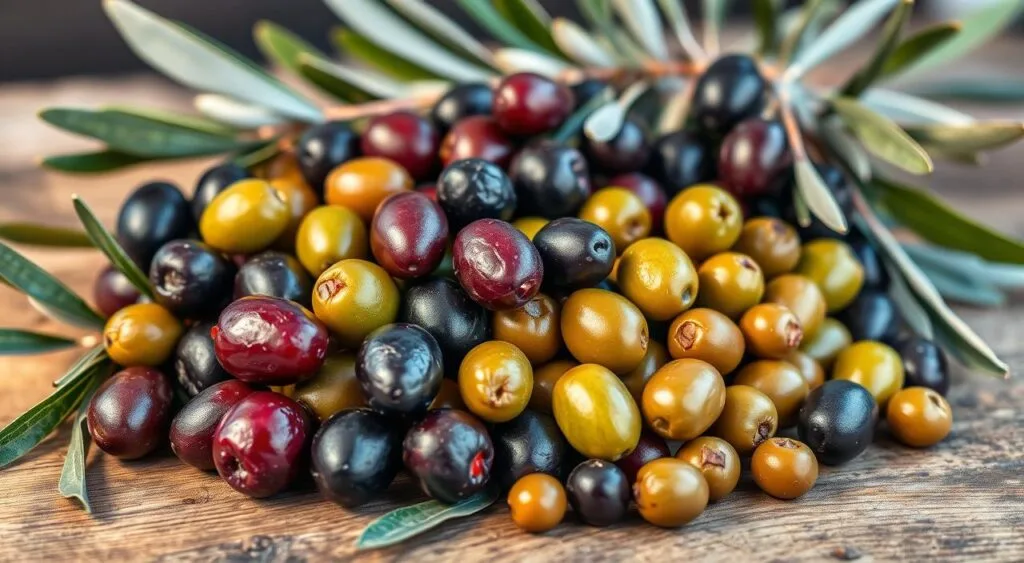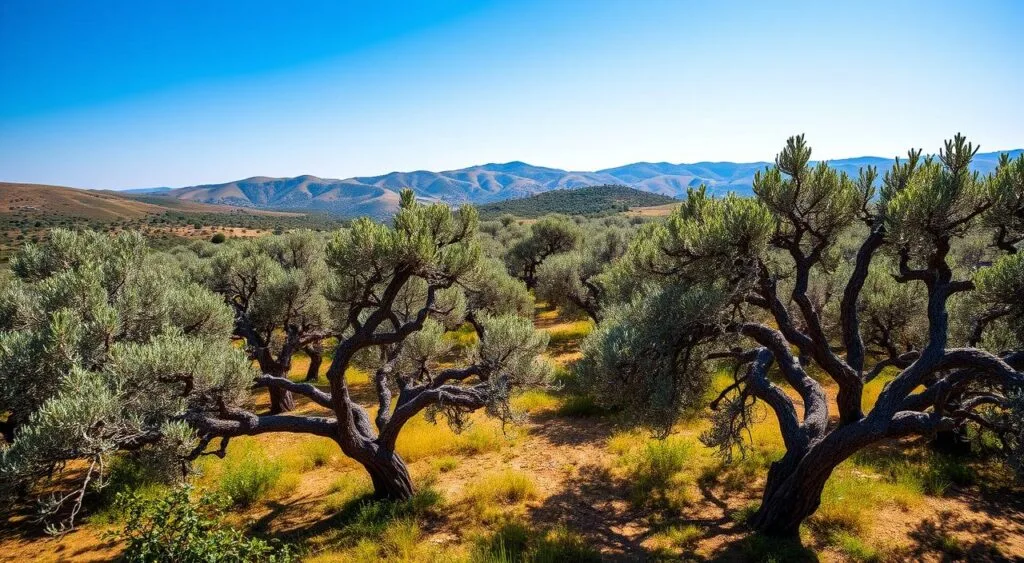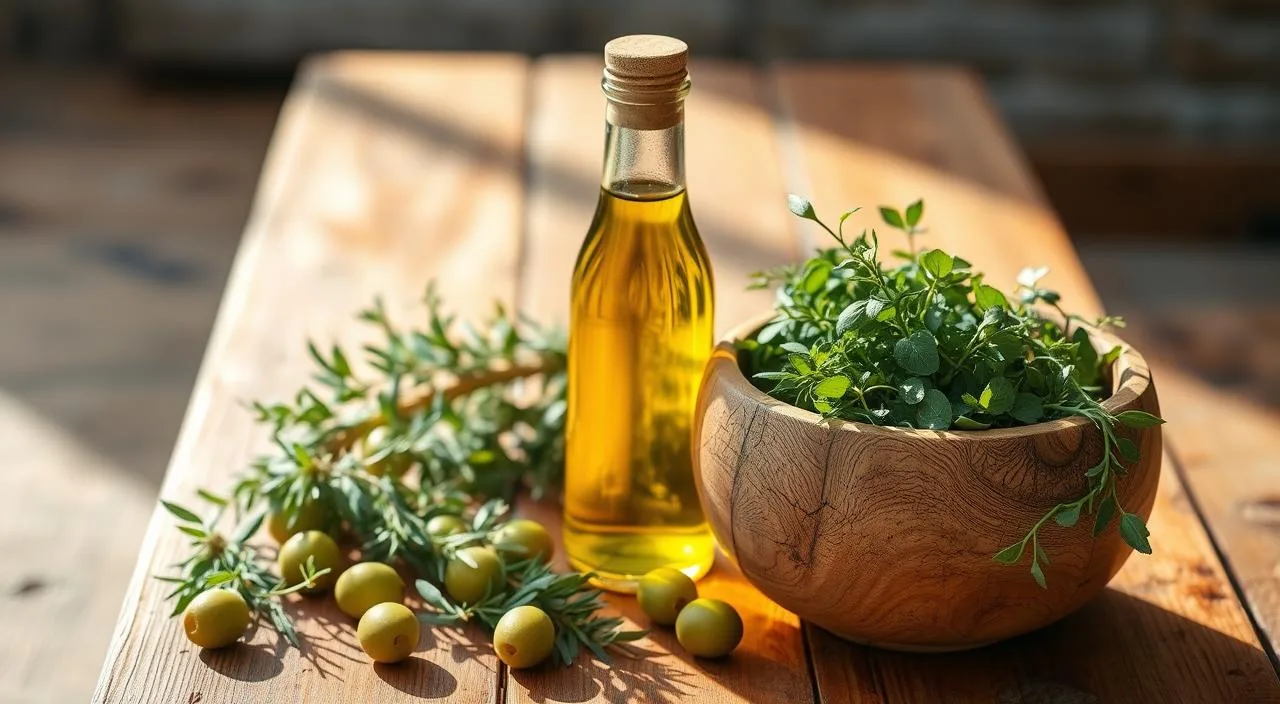Greece is famous for its amazing olive oil, right in the Mediterranean’s heart. It’s known for its great taste, bright color, and health benefits. People all over the world love it for its unique flavor.
Greece’s olive oil tradition goes back thousands of years. The country’s mild weather, rich soil, and old farming ways make it special. It’s a key part of the Mediterranean diet, loved for its health and taste.
Key Takeaways
- Greece’s olive oil heritage spans thousands of years, rooted in the country’s unique climate and cultivation practices.
- Greek olive oil is renowned for its exceptional flavor, vibrant color, and exceptional nutritional profile.
- The Mediterranean diet, with Greek olive oil at its heart, is celebrated for its health benefits and culinary excellence.
- Authentic Greek olive oil has gained global recognition and is sought after by discerning foodies and health-conscious consumers.
- Exploring the nuances and regional varieties of Greek olive oil can unlock a world of gastronomic delights.
Understanding the Legacy of Greek Olive Oil Through History
The history of Greek mediterranean olive oils goes back to ancient times. Olive trees and their oil were key in the culture of the area. They were important in the Minoan, Mycenaean, and Classical Greek societies. Later, the Byzantine and Ottoman empires also played a role in olive oil production in greece.
Ancient Origins and Cultural Significance
Olive oil has been valued in Greece for thousands of years. Archaeology shows olive trees were first grown here around 4,000 BC. The olive tree and its oil were seen as sacred, used in religious rituals, cooking, and even the Olympic Games.
Traditional Production Methods Through Generations
- The old ways of making olive oil production in greece have been kept alive for generations. This keeps the art of making oil alive.
- Olives are still picked by hand, often by families who have cared for the trees for centuries. This ensures the best quality.
- Stone mills and cold-pressing are used, along with careful quality checks. This makes the mediterranean olive oils from Greece famous all over.
The lasting impact of Greek mediterranean olive oils shows the hard work and skill of olive oil makers. They have kept old traditions alive while also using new ways to make oil.
What Makes Extra Virgin Olive Oil from Greece Special
Greece is known for its top-notch greek extra virgin olive oil. The country’s long history and traditional ways of making olive oil create a unique product. This product is loved worldwide and is considered the best greece olive oil.
The taste of Greek extra virgin olive oil is special. Olives are picked when they’re just right, giving the oil a lively, peppery smell and a creamy taste. This taste comes from Greece’s Mediterranean climate and the careful work of olive growers.
| Characteristic | Greek Extra Virgin Olive Oil | Other Mediterranean Olive Oils |
|---|---|---|
| Flavor Profile | Robust, peppery, and buttery | Milder, with subtle fruity or nutty notes |
| Acidity Level | Exceptionally low, typically less than 0.8% | Generally higher acidity levels |
| Antioxidant Content | Exceptionally high, due to the optimal harvesting time | Moderate to high, depending on the region |
Greek extra virgin olive oil is also known for its high quality. The country has strict rules for testing and certifying olive oil. Only the best oils get the “extra virgin” label. This shows the pride and hard work of Greek producers.
“Greek extra virgin olive oil is a true reflection of the land and the people who cultivate it. It’s a taste of history, a celebration of tradition, and a testament to the pursuit of perfection.”
The unique taste, low acidity, and high antioxidants make greek extra virgin olive oil the best greece olive oil. It shows Greece’s rich culture and the dedication of its olive oil makers.
Premium Greek Olive Varieties and Their Characteristics
Greece is famous for its top-notch greek olive varieties. These varieties are key to the country’s famous olive oil. The Koroneiki olive is especially celebrated. It’s small, round, and has a high oil content with a fruity taste.
Koroneiki: The Crown Jewel of Greek Olives
The Koroneiki olive comes from the Peloponnese region. It’s small and has a delicate skin, making it hard to harvest. But the effort is worth it for its intense aroma and smooth finish.
Regional Olive Varieties and Their Distinct Flavors
- Chalkidiki: From northern Greece, this olive is large and green. It has a mild, buttery taste, great for cooking and dipping.
- Megaritiki: From the Peloponnese, this olive is medium-sized. It has a bold, fruity taste with notes of almond and artichoke.
- Manaki: Found in Crete, this small, dark olive has a robust, peppery taste. It’s perfect for both savory and sweet dishes.
Harvesting Techniques for Different Varieties
Harvesting greek olive varieties depends on the type. Koroneiki olives are hand-picked, while bigger ones like Chalkidiki and Megaritiki are picked mechanically. The goal is to get the best quality olives for top-notch greek olive oil.

| Olive Variety | Region | Flavor Profile | Harvesting Method |
|---|---|---|---|
| Koroneiki | Peloponnese | Intense, complex aroma, smooth, peppery finish | Hand-picked |
| Chalkidiki | Northern Greece | Mild, buttery | Mechanically harvested |
| Megaritiki | Peloponnese | Bold, fruity with hints of almond and artichoke | Mechanically harvested |
| Manaki | Crete | Robust, peppery | Hand-picked |
The Mediterranean Climate’s Impact on Greek Olive Groves
Greece’s Mediterranean climate is key to its top-notch olive oils. The Aegean and Ionian coastlines are perfect for olive trees. Here, warm weather, lots of sun, and just the right amount of rain make for great olive growing.
The mild climate lets olive trees grow well and produce lots of mediterranean olive oils. The rich, well-drained greek olive groves add to the olives’ special taste. This makes Greece famous for its extra virgin olive oil.
| Climate Factor | Impact on Greek Olive Groves |
|---|---|
| Mild Temperatures | Supports consistent growth and fruit development throughout the year |
| Abundant Sunshine | Enhances the olives’ oil content and intensifies the flavors |
| Moderate Rainfall | Provides the ideal moisture levels for optimal olive tree health and yield |
| Nutrient-Rich Soil | Contributes to the unique aromatic profile and taste of the olive oil |
The mix of Greece’s climate and traditional olive growing makes its mediterranean olive oils stand out. These oils are complex, balanced, and good for you. The land and the hard work of Greek farmers make each bottle of greek olive oil special.

Greek Olive Oil Production: From Grove to Bottle
The journey of exceptional olive oil production in greece starts in lush groves. Here, generations of Greek farmers care for their olive trees. This effort leads to top-notch greek olive oil brands loved worldwide.
Modern Processing Technologies
Greek olive oil makers use the latest tech to improve their work. They use advanced harvesters and extraction methods. These steps help keep the oil’s natural taste and quality.
- Cold-pressing: Olives are cleaned and crushed without heat or chemicals.
- Centrifugal separation: Oil is separated from the olive paste with high-speed centrifuges.
- Nitrogen blanketing: Bottled oil is kept fresh with a nitrogen gas layer.
Quality Control Standards
The greek olive oil brands focus on quality. They test and certify each oil to ensure it’s extra virgin and tastes great.
| Quality Metric | Strict Threshold |
|---|---|
| Acidity Level | Less than 0.8% |
| Peroxide Value | Less than 20 meq O2/kg |
| Sensory Evaluation | Flawless aroma and flavor |
Following these strict standards, Greek olive oil producers protect their products’ quality. They ensure each bottle captures the Mediterranean’s true essence.
Health Benefits and Nutritional Value of Greek Olive Oil
Greek olive oil is known for its high quality and health benefits. It’s a key part of the Mediterranean diet. This oil is packed with nutrients and has healing properties.
The fatty acid profile of Greek olive oil is exceptional. It has a lot of monounsaturated fats, like oleic acid. This helps lower bad cholesterol and raise good cholesterol. Eating Greek olive oil regularly can lower the risk of heart disease, stroke, and diabetes.
Greek olive oil does more than just protect the heart. It’s full of antioxidants, like polyphenols and vitamin E. These fight off oxidative stress and inflammation. Research shows it may help with arthritis, Alzheimer’s, and some cancers.
| Nutrient | Concentration in Greek Olive Oil |
|---|---|
| Monounsaturated Fats | Up to 80% of total fat content |
| Polyphenols | Higher than most other olive oil varieties |
| Vitamin E | Abundant, providing antioxidant protection |
The health benefits of Greek olive oil make it a key part of the Mediterranean diet. It’s a must-have for anyone looking to improve their health. Its unique mix of nutrients and traditional production make it a treasured item.
Leading Greek Olive Oil Brands in the Global Market
Greece is famous for its top-notch olive oils. The country’s best brands are known worldwide for their great taste and quality. These brands have helped make Greece a top exporter of greek olive oil brands globally.
Award-Winning Producers
Many Greek olive oil brands have won big at international competitions. For example, Gaea, a family business, won the “Best Organic Olive Oil” award at the New York International Olive Oil Competition. Elea, famous for its Koroneiki variety, has also won many gold medals for its quality.
International Recognition and Certifications
The amount of olive oil exports greece has been rising. This is thanks to the high quality and unique tastes of Greek olive oils. Many brands have gotten important certifications like the Protected Designation of Origin (PDO) and Protected Geographical Indication (PGI). These show the olive oil’s true origin and quality.
| Brand | Awards and Certifications | Key Varieties |
|---|---|---|
| Gaea | Best Organic Olive Oil (New York International Olive Oil Competition) | Koroneiki |
| Elea | Multiple Gold Medals | Koroneiki |
| Kalamata | PDO Certification | Koroneiki, Manaki |
| Messinia | PGI Certification | Koroneiki, Athinoelia |
These top greek olive oil brands are not just known in Greece. They have also made a big name for themselves worldwide. This has helped Greece become known as a top producer of excellent olive oil.
Sustainability Practices in Greek Olive Oil Industry
The Greek olive oil industry is known for its dedication to sustainability. It balances tradition with environmental care. Producers use organic farming and eco-friendly packaging to reduce their impact on the environment.
They deeply value the land and the traditions passed down through generations. Many Greek olive oil producers choose organic farming. This avoids synthetic fertilizers and pesticides, protecting the soil and the ecosystem.
Water conservation is also a big part of their work. In a dry climate, they use advanced irrigation and water-saving technologies. This helps them use water wisely, keeping their olive oil quality high while protecting the environment.
FAQ
What makes Greek olive oil so special?
Greek olive oil is known for its top-notch quality, rich taste, and health perks. Greece’s long history in olive oil making and its perfect Mediterranean weather make its olive oil stand out.
How does Greek olive oil differ from other Mediterranean olive oils?
Greek extra virgin olive oil has a unique taste, with hints of fruit, bitterness, and a strong punch. This comes from Greece’s many olive types, like Koroneiki, and old-fashioned making methods.
What are the most popular Greek olive oil varieties?
Koroneiki is the star of Greek olive oils, known for its top quality and special taste. Other favorites like Athinoelia, Manaki, and Kalamon add to Greece’s olive oil variety, each with its own flavor.
How does the Mediterranean climate impact the quality of Greek olive oil?
Greece’s Mediterranean weather is perfect for growing olives. The mild winters, hot summers, and lots of sun help olives grow with unique flavors and lots of antioxidants.
What are the health benefits of consuming Greek olive oil?
Greek olive oil is full of good fats, antioxidants, and anti-inflammatory stuff. Eating it regularly can help lower heart disease risk, improve cholesterol, and even help your brain and overall health.
Which Greek olive oil brands are recognized globally?
Brands like Gaea, Evoo, and Kyklopas are famous worldwide for their quality. They’ve won big awards and certifications, showing Greece’s leading role in olive oil.
How does the Greek olive oil industry prioritize sustainability?
The Greek olive oil world focuses on being green. They use organic farming, save water, and choose eco-friendly packaging. This keeps their tradition alive while caring for the planet.
